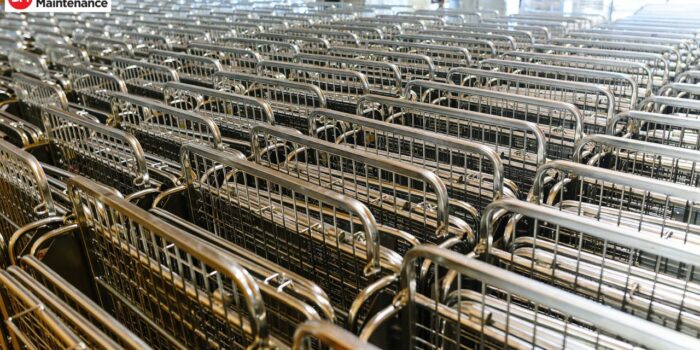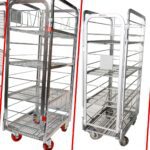Roll Cage Castors 101: Everything You Need to Know
Roll cages are essential tools in any busy warehouse or storage facility, used to move goods around efficiently and keep things organised. But those cages wouldn’t get very far without their castors – the small wheels attached to the base. Choosing the right roll cage castors for your roll cages is more important than you might think. It can significantly impact how smoothly your warehouse operates, affecting everything from how easy they are to move and how long they last to how much noise they make and whether they protect your floors.
This guide provides a comprehensive overview of roll cage castors, explaining the different types, key considerations, and essential factors to help you make the best choices for your business.
Types of Roll Cage Castors
Castors are made from a variety of materials, each with its own strengths and weaknesses:
● Polyurethane (PU) Castors: These are tough and durable, able to handle heavy loads and withstand tough conditions. They’re also great for rough or uneven floors because they resist wear and tear.
● Rubber Castors: If you need a smooth and quiet ride, rubber castors are the way to go. They’re good for protecting your floors and for moving delicate items because they absorb shocks well.
● Nylon Castors: These are lightweight and resistant to chemicals, which is helpful in environments where hygiene is important. However, they can be a bit noisy on hard floors.
● Sandwich Composite Castors These are very popular castor choice, offering a good compromise between the properties of both nylon and rubber castors, but still providing noise reduction qualities
Choosing the Right Castors: Key Considerations
Selecting the perfect castors for your roll cages requires careful consideration of several factors:
● Load Capacity: Think about the heaviest items you’ll be carrying in your roll cages and choose castors that can handle that weight. It’s always better to choose castors that can handle a bit more weight than you think you’ll need, just to be safe.
● Floor Surface: The type of floor in your warehouse matters. Smooth concrete floors work well with hard nylon or rubber castors, but if your floors are rough or uneven, you might need tougher PU castors.
● Environment: Think about where your roll cages will be used. Will they be in a wet or humid area? Are there any chemicals around? Choose castors made from materials that can handle these conditions.
● Manoeuvrability: Consider how easily you need to move your roll cages. Larger wheels are generally better for moving over obstacles and for manoeuvring, while smaller wheels are good for tight spaces.
● Swivel vs. Fixed: Swivel castors allow the roll cages to turn easily, while fixed castors are better for moving in a straight line. You might need a combination of both depending on how you use your roll cages.
● Brakes: If you’ll be using your roll cages on slopes or need to stop them frequently, brakes are a must-have for safety.
Colour-Coded Efficiency: Enhancing Organisation and Safety
In addition to the factors mentioned above, colour can also play a significant role in your choice of castors. While it might seem like a minor detail, colour-coded castors can contribute to improved organisation and safety within your warehouse. For instance:
● White nylon castors: These are often used in environments where cleanliness and hygiene are paramount, such as food processing or pharmaceutical facilities.
● Blue rubber castors: These might be chosen for specific areas of your warehouse or for certain types of roll cages, aiding in visual identification and organisation.
● Sandwich composite castors: These typically feature a combination of colours (like red and grey), offering both durability and visual distinction.
By strategically using colour-coded castors, you can:
● Improve organisation: Easily identify different types of roll cages or those designated for specific areas.
● Enhance safety: Highlight potential hazards or restricted areas by using specific castor colours.
● Streamline workflows: Direct the flow of goods and improve efficiency with colour-coded routes.
Don’t Forget These Factors!
● Noise Levels: If noise is a problem in your warehouse, rubber or PU castors are quieter than nylon or cast iron.
● Floor Protection: To avoid damaging your floors, choose rubber or PU castors that won’t leave marks.
● Maintenance: Some castors need regular cleaning or oiling to keep them working well.
● Cost: Castor prices vary, so it’s important to find a balance between cost, how well they work, and how long they last.
Distribution Maintenance: Your Castor Experts
At Distribution Maintenance, we know how important it is to choose the right castors. We offer a wide selection of high-quality castors to suit different needs and environments. Our team can help you make the right choice for your business.
Conclusion
Choosing the right castors for your roll cages is a big decision that can make a real difference in your warehouse. By thinking about things like how much weight they need to carry, the type of floor you have, and how easy they need to be to move, you can choose castors that will make your warehouse more efficient and safe.
If you’re still not sure which castors are best for you, get in touch with Distribution Maintenance. We’re happy to help you find the perfect solution to keep your warehouse running smoothly.









